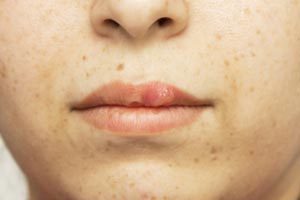Oral Shingles: Can You Get Shingles In Your Mouth?
 It is entirely possible to develop shingles in your mouth and oral shingles can be incredibly painful. The same virus (varicella-zoster) that causes chickenpox causes shingles. Anyone that had chickenpox as a child can develop shingles. Unlike chickenpox, you can get shingles more than once.
It is entirely possible to develop shingles in your mouth and oral shingles can be incredibly painful. The same virus (varicella-zoster) that causes chickenpox causes shingles. Anyone that had chickenpox as a child can develop shingles. Unlike chickenpox, you can get shingles more than once.
Even after you fight off chickenpox, the varicella-zoster virus remains dormant in your body. It can reawaken decades later, provoking a shingles outbreak. Shingles can surface just about anywhere on your body, including inside of your mouth.
Shingles causes an itchy and burning rash that can persist for weeks. This is especially uncomfortable and painful with oral shingles.
What Does Shingles In The Mouth Look Like?
The shingles rash is not as well defined inside of the mouth as it is on the skin, which makes it more difficult to diagnose. The markings of the virus will generally follow the path of the trigeminal nerves, stopping at or around the midline of the face.
Signs You Have Oral Shingles
It’s not always easy to tell if oral shingles is to blame for your mouth pain. Some key indicators include:
-You have had chickenpox in the past.
-You have a rash or blisters inside of your mouth.
-Shingles may appear on the tongue and palate with rash and blistering forming on the same side of the face.
-You have altered taste buds.
-Prior to the development of a rash, you experienced burning, itching, pain or tingling in your mouth.
-Shingles may also bring about fever, chills, stomach pains, malaise, swollen lymph nodes, joint pain and headaches.
Shingles can impact anyone that had chickenpox when they were younger. It is most likely to impact people over 60-years of age, people who had chicken pox prior to their first birthday, and those with a weakened immune system.
Why Does Oral Shingles Hurt So Much?
47% of motor and sensory neurons of the brain’s frontal cortex are linked to the mouth and face. That’s why shingle outbreaks in the mouth or on the face tend to be the most painful. The frontal cortex is responsible for speech, problem solving and memory; as a result oral shingles can impact a wide variety of functions.
Dental Complications Associated With Oral Shingles
Shingles of the mouth can feel like a toothache. This is why patients often end up at the dentist instead of at the doctor. The sensory nerves impacted by shingles lead into the tooth pulp, which is filled with nerve endings and results in feelings associated with a severe toothache. Patients often undergo extraction or fillings because the dentist believes a cavity is fully responsible for the pain.
How To Treat Shingles In The Mouth
Common antiviral drugs prescribed to treat shingles include Valacyclovir (Valtrex), Famciclovir (Famvir) or Acyclovir (Zovirax). Antiviral drug therapy is highly beneficial but must be started as soon as possible to counteract the virus. It’s best to start within 48-hours of symptoms. If taken too late, the antiviral may have little to no effect on recovery time, but many patients still opt to take it in hopes of some relief.
You can help reduce discomfort caused by oral lesions by using soothing mouth rinses and/or topical anesthetics. Pain medications are often prescribed as well, such as Benadryl.
Is Shingles Contagious?
Yes, shingles is contagious. You are contagious 2 days prior to the appearance of the rash and remain contagious until all of the lesions crust over and there is no more drainage. It is important to note that viral shedding can occur even with no visible sign of lesions.
Long Term Side Effects Of Oral Shingles
Some patients experience post-herpetic neuralgia, which can last for several months or even years. Other potential side effects include diminished hearing, scarring, paralysis, eye damage, permanent pain, vertigo and blindness. Some people experience very strange side effects, such as watering of the eyes or uncontrollable eye closure when smiling. This can occur if damaged nerves grow back into the wrong areas.
Should You Get The Shingles Vaccine?
Zostavax® was approved by the FDA in 2006. It is recommended for people over 60 and at a greater risk for developing shingles. The vaccine is not recommended for patients over 80-years-old or patients with allergies to gelatin or the antibiotic Neomycin. It is not advised for patients trying to get pregnant or already pregnant due to potential fetus damage.
Visit Urgent Medical Center today to get your shingles vaccine!
